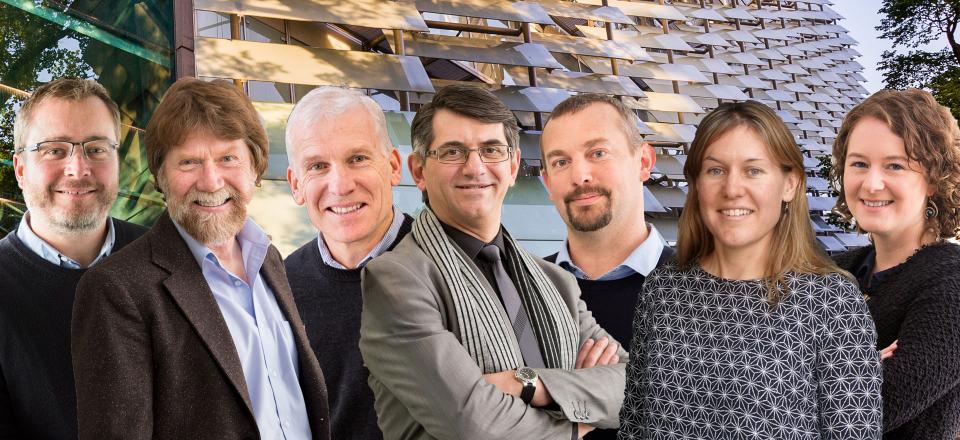Bio21 researchers awarded NHMRC fellowships and project grants

NHMRC Results were announced on the 12 December.
To date, the 2018 NHMRC Grant Application Round has resulted in the commitment of more than $783 million to fund health and medical research including 1045 new grants to universities, medical research institutions and hospitals across Australia.
Of those 75 went to University of Melbourne researchers to support research in basic science, clinical medicine, health services and public health in the latest round of NHMRC funding, announced by the Hon. Greg Hunt, Minister for Health.
Congratulations to Institute members Danny Hatters, Jose Villadangos, Malcolm McConville, Justine Mintern, Stuart Ralph, Kat Holt and Paul Gleeson.
Research Fellowships:
Danny Hatters: $649 175
Proteostasis mechanics of neurodegenerative diseases
The main feature of many neurodegenerative diseases is inappropriate protein aggregation arising from protein homeostasis (proteostasis) imbalance. My vision is to capitalize on a suite of new methods I have established to determine how breakdown in cellular mechanisms that govern proteostasis relates to neurodegenerative diseases. This knowledge will lead to new diagnostic approaches, therapeutic targets and drugs to treat diseases including Alzheimer and Huntington diseases.
Prof Jose Villadangos: $785 385
Antigen presentation in health and disease
The research program I will carry out during this fellowship will characterise how the immune system detects and starts responses against pathogens and cancer cells. I will describe proteins and intracellular processes required to fulfil this function, which may be harnessed to develop more effective vaccines against infections, protect critically ill patients from hospital acquired infections, prevent autoimmunity and fight cancer.
Prof Malcolm McConville: $785 385
Targeting the metabolism of parasitic protozoa
Efforts to control the spread of devastating parasitic diseases, such as malaria, leishmaniasis, cryptosporidiosis and toxoplasmosis, have been limited by the inadequacy of current drug options. This proposal will utilize advanced analytical and computational approaches to identify aspects of host-pathogen metabolism that are essential for disease and use this information to prioritize new drug targets and develop antimicrobial drug leads.
Standard Project Grant:
A/Pr Kathryn Holt
A statistical framework to exploit routine pathogen genomics data for public health
Pathogen genomics is increasingly used in public health labs for routine surveillance of notifiable infectious diseases, particularly foodborne and sexually transmitted illnesses. This approach is well established for outbreak investigations, helping epidemiologists to identify sources of infection and disease transmission to guide interventions. This project aims to develop new methods to harness the power of routine genomics data to detect outbreaks earlier and intervene sooner.
Dr Justine Mintern: $574 920
MARCH ubiquitin ligases in immunity and infection.
Cells use molecules on their surfaces to communicate with other cells and their environment. 'MARCH' proteins are switches that instruct molecules to stay or leave the cell surface and control which molecules are displayed and how many. This project will identify how MARCH play important and unexpected roles in the immune response and in fighting infection to virus.
A/Pr Daniel Hatters: $997 204
The metastability of proteome foldedness in neurodegenerative disease.
Proteins are used by cells to control almost all their functions. A key feature of neurodegenerative diseases, like Alzheimer’s and Huntington’s is that certain proteins abnormally aggregate together which interferes with biological function. This grant seeks to understand why this happens and what the implications are for cellular survival. Gaining this knowledge will aid in the design of therapies combat this abnormality or prevent the damage that is caused by it.
Prof Jose Villadangos: $1 273 624
Functional impairment of mouse and human dendritic cells following Systemic Inflammatory Response Syndrome (SIRS): towards novel diagnostics and treatments.
Severe infections, trauma or stroke cause Systemic Inflammatory Response Syndrome (SIRS). SIRS patients often succumb to otherwise innocuous infections because SIRS induces a long state of immune suppression. We think an underlying mechanisms is the functional impairment of a critical immune cell type called dendritic cells (DC). The goal of this grant is to develop tools to measure, predict and prevent the formation of these 'paralysed DC' to restore a healthy immune system in SIRS patients.
A/Pr Stuart Ralph: $859 130
Regulation of stage differentiation in apicomplexan parasites by alternative splicing
Multicellular organisms possess different specialised cells with different gene products in different cell types. Much of this specialisation is due to alternative processing (splicing) of gene transcripts. We have recently described the same phenomenon in unicellular parasites. We will now test how alternative splicing drives cellular differentiation to generate specialised parasite forms that infect mosquito vectors, and forms that cause latent, untreatable infections.
Prof Paul Gleeson: $674 920
Defining the anterograde and endocytic trafficking pathways in primary neurons; relevance to dysfunctional trafficking of BACE1 and APP in Alzheimer’s disease.
Alzheimer’s disease results from toxic peptides arising from the cleavage of a large molecule called APP in the brain. The production of toxic peptides is normally regulated by the transport of APP molecules between compartments inside the cell. In Alzheimer’s disease, the APP transport pathways are altered leading to high levels of toxic peptide.This research will discover the basis for the altered transport of APP in disease, information which could allow new approaches for dementia treatment.

